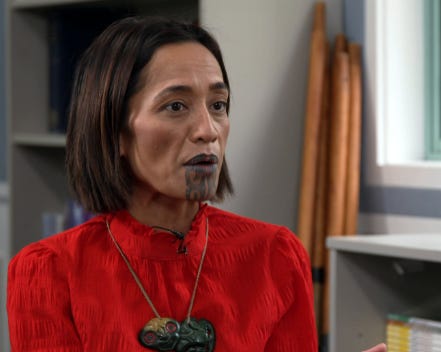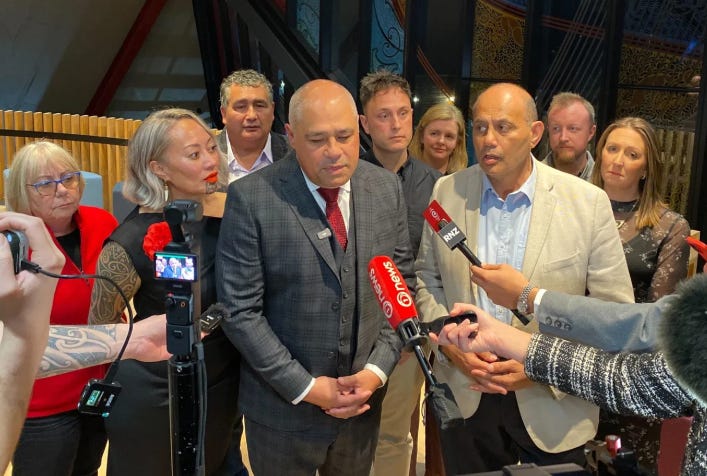The results of the recent Tāmaki Makaurau by-election are already reverberating for the candidates, their political parties, but also New Zealand as a whole.
Well, I was wrong. I thought Peeni Henare from Labour would win the Tamaki Makaurau by-election. Instead, the Māori Party’s Oriini Kaipara did and convincingly so.
The reverberations of this are relatively significant - for the Labour Party, the candidates themselves, and the growing politics of grievance.
Congratulations rightly begin with the winner, however worryingly, she has shown little capability during the campaign. The interview on Q+A was a train wreck and a surprise from someone supposedly skilled in media. There is always a chance of improvement but I suspect not for one simple reason - she was chosen for who she is, not what she is. Other than being angry and appropriating the symbols of grievance, resistance, and violence, she has little else to say of herself.

The by-election’s winning candidate, Oriini Kaipara from Te Pati Maori
Her performative campaign lacked substance, but it was this angry performance that clearly mattered to the few who bothered to vote. I do not see this as good for politics. I think most of us would hope for more discussion of experience, policy ideas, or simply a positive articulation of what one will do when elected.
The voter turnout was very low, just over 27%. There have been other low turnouts, such as the Hamilton West by-election of 2022 with just over 31% turnout but this one - 27% - is woeful and particularly so when we consider how much importance is given to these special seats for Māori representation, and yet this importance is clearly not shared by the voters.
A further reverberation is the Māori Party’s continuing disrespect of our electoral rules and norms. We already know of the ongoing financial irregularities and their propensity to use aggressive and violent imagery. Yet in this campaign alone, we have seen outright racism when Māori Party MP, Tākuta Ferris, questioned why non-Māori New Zealanders are allowed to campaign along Māori (see image below). The same MP happily broke electoral law by actively campaigning on election day. All of this from a political party that talks a lot about partnership, treaty relationships, being ‘in this together’ and so on. It is of course all a pretense given all that the Māori Party says and does - but it is surprising how few take notice as this mask continually slips away.

The mask also slipped on election night when the Māori Party banned most of the mainstream media from attending their function. This is somewhat ironic considering Kaipara once worked in media. The excuses for this action reverberate along the all too familiar grievance narrative - in this case, the Māori Party claiming they are victims of media harassment and hurt yet offering absolutely no proof. I would suggest it is simply a desire to avoid accountability.
All of this acts as a warning to those with eyes to see and ears to hear. The Māori Party are happy to use the democratic structures around them in order to tear them down.
As for Peeni Henare and the Labour Party, the reverberations go deep. This loss will be a shock including how convincing it was. One has to ask was the Labour Party campaign machine fully behind Henare or was he left somewhat isolated, particularly when he seemed to indulge leadership rumours.

Labour MP and by-election candidate, Peeni Henare, concedes defeat
That Chris Hipkins was not at his election night function was also not a good look, for either man. Henare will of course stay on in parliament, but any future ambitions have taken a significant hit. At the last election, he and Labour could point to the 42 vote margin and the likely fraudulent activities at the Manurewa marae. But this loss cannot be explained away easily.
The Labour Party has some serious work to do before the next general election. While it might be comfortable with current polling putting it neck and neck with National, that its campaign machine and strategy failed so spectacularly is a sign of deep problems including a disconnect from their traditional voters. There is also a question that the Labour leadership must answer as they approach election year (and it will be a critical question) and that is will Labour cooperate with the radical, race obsessed Māori Party? If Labour says yes to a possible coalitioni, they will lose the election. Yet we also know, that Labour’s path to power in 2026 currently requires the Māori Party’s numbers.
To end on a note that is more uplifting and a refreshing counter-narrative to the victim mentality of the Māori Party, Kaipara, and their supporters. It is the words the Māori Queen, Nga wai hono i te po, when she spoke last week and said:
“Being Māori is not defined by having an enemy or a challenge to overcome.
Being Māori is speaking our language. It is taking care of the environment. It is reading and learning about our history. It is the choice to be called by our Māori name. There are many ways to manifest being Māori, not just in times of protest.
My father said 'be Māori all day, every day', because he knew we needed to be strong in good times and bad, with or without protest. And that's how we can express our vitality as Māori.”
Simon O'Connor a former National MP graduated from the University of Auckland with a Bachelor of Arts in Geography and Political Studies . Simon blogs at On Point - where this article was sourced.


5 comments:
Lets see what being Māori everyday manifests in the future with the leader of the Tainui gang.
So the maori queen is just confirming that the concept of maori is purely a cultural choice. Much like Islam, it overrides any ethnic lineage and is a way of life, a personal decision.
For the recent by-election result giving Te Pati Maori a deserved and clear-cut victory, I’d like to borrow a quote from Simon O’Connor: “Today is a good day”
What a shame the MQ didn’t urge everyone to be a New Zealander. Ah well, if her direction is to be followed we will all have to choose which category we will place ourselves in. If the box fits, climb in.
And so, here in New Zealand we see the 'rolling out' of the NZ Māori version of the African National Congress(ANC) - which includes -
- the rhetoric
- clothing - red berets to start with
- the verbal 'attacks' on White Supremacy
- the ignoring (deliberately) and abuse of the Democratic process of Government & Governing (not being in involved in good debate - but rather debate that is vitriolic)
- ignoring The Laws of Land as they currently stand
- seeking to establish their own Nation & Laws
- the use of monies that were given in honest assumption for a "use', but was used in another way
- the emergence of a "hierarchal" Tribal structure (The Anglo Saxon has a video on this)
I await the "emergence of armed mobs" that attack & destroy infrastructure, the seizing of property, the deaths of those "who stand in the way" - just as ANC supporters did (and still do) across South Africa, to which the end result has been the destruction of that Nation.
And meantime - Jetstar, Quantas, Air NZ - carry more New Zealander's across the 'ditch' to seek a better life - just as they have done across the years.
Post a Comment
Thank you for joining the discussion. Breaking Views welcomes respectful contributions that enrich the debate. Please ensure your comments are not defamatory, derogatory or disruptive. We appreciate your cooperation.